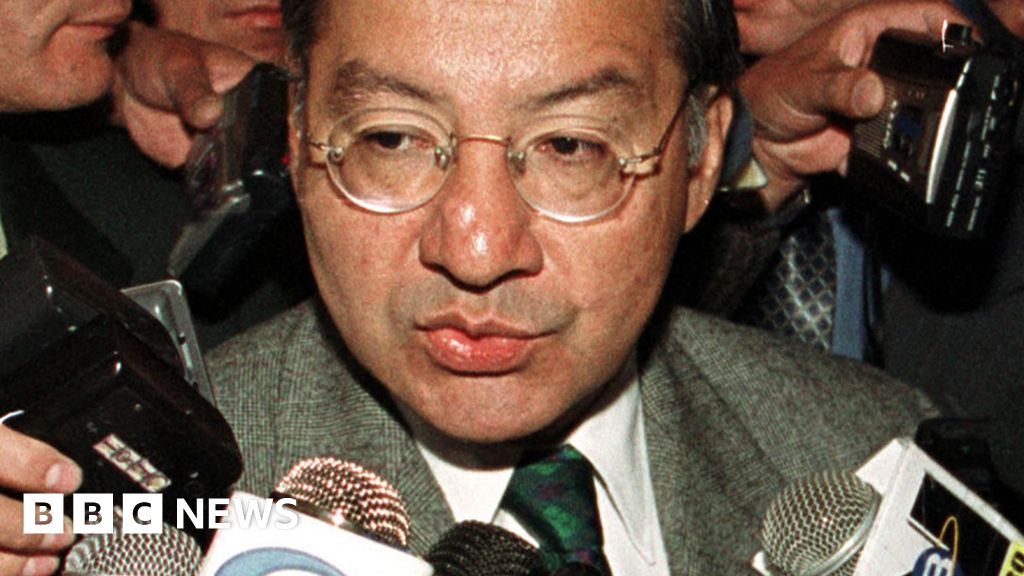- Written by Will Grant
- BBC News, Cuba correspondent
image source, AFP (via Getty Images)
Former U.S. Ambassador to Bolivia Manuel Rocha admits to acting as a Cuban agent for more than 40 years
A former career U.S. diplomat who served as U.S. ambassador to Bolivia has pleaded guilty to working as a Cuban agent for more than 40 years.
Victor Manuel Rocha, 73, is accused of secretly passing information to the communist-run Cuban government since 1981, when he worked for the U.S. State Department.
On Thursday, he changed his original not guilty plea in a Miami courtroom.
He is scheduled to be sentenced at a hearing on April 12th.
The move brings one of the most high-profile espionage cases between Cuba and the United States to an unexpectedly swift conclusion.
Thursday's court hearing was supposed to be about the handling of classified documents related to the case, the Miami Herald reported.
But instead, Mr. Rocha, his lawyers and prosecutors confirmed that a plea deal had been reached.
When Judge Beth Bloom asked him if he wanted to change his plea to guilty, he replied: “Sir, I agree.”
He is charged with violating the Foreign Agents Registration Act for acting as a foreign agent to obtain a U.S. passport, wire fraud, and making false statements.
Evidence collected by investigators includes Rocha admitting to working for Cuba for decades, praising late Cuban leader Fidel Castro as a “commander” and calling the United States an “enemy.” Contains secret recordings.
He and his defense team now appear to have reached a similar conclusion, calculating that a guilty plea is the wisest option.
The BBC has contacted his lawyer for comment.
Mr. Rocha must accept the U.S. government's accusation that he has spent virtually his entire professional career working for the Cuban revolution at U.S. outposts in Havana and Buenos Aires, while simultaneously rising through the ranks as a U.S. diplomat.
Rocha's sentence and whether he took a plea deal in exchange for his cooperation have not yet been discussed in court.
U.S. authorities have released footage of Manuel Rocha secretly filmed by FBI agents.
“They owned us. They defeated us. That's one of the reasons I have a personal grudge against Cuban intelligence, because they were very active in their operations against us. Because we've been successful in that,” Olson said.
“He's a traitor. He betrayed our country. I think that's despicable and I don't think he'll ever see the light of day again.”
The United States and Cuba have had a rocky relationship since Fidel Castro overthrew the U.S.-backed government more than 60 years ago.
The United States imposed a trade embargo against Cuba in the 1960s. Former President Barack Obama and former Cuban President Raul Castro took steps to normalize relations in 2015, but former US President Donald Trump later reversed many of these steps.
Mr. Rocha was born in Colombia, raised in New York City, and holds degrees from Yale, Harvard, and Georgetown universities.
Prosecutors said he served as the U.S. ambassador to Bolivia from 1999 to 2002 and spent 25 years in multiple government positions, including the National Security Council. In addition to Bolivia, he also served in Argentina, Honduras, Mexico, and the Dominican Republic.
After leaving the diplomatic service, he continued a lucrative career in private consulting as a special advisor to the U.S. Southern Command, the part of the U.S. military that oversees Cuba.
The indictment alleges that in November 2022, an undercover FBI agent contacted Rocha via WhatsApp and delivered a message from “friends in Havana” who were representatives of Cuban intelligence.
According to court documents, Mr. Rocha agreed to meet with agents several times, including once at a food court. That's because “there was no chance of anyone seeing it” there, he said.
The indictment states that during three meetings with an undercover FBI agent, Rocha began divulging details about his time working as a secret agent for the Cuban government.
Rocha allegedly used the word “we” to describe Cuba and himself and said, “We want to protect what we have done.”
When an agent posing as a Cuban spy asked him, “Are you still with us?” Rocha responded that he was “angry” at having his loyalty questioned.
“It's like questioning your manhood,” he said.
With additional reporting by Max Matza


